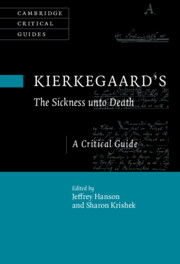Book contents
- Kierkegaard’s The Sickness unto Death
- Cambridge Critical Guides
- Kierkegaard’s The Sickness unto Death
- Copyright page
- Contents
- Contributors
- Acknowledgments
- Abbreviations
- Introduction
- Chapter 1 Kierkegaard’s Place of Rest
- Chapter 2 Publishing The Sickness unto Death
- Chapter 3 Kierkegaard on the Self and the Modern Debate on Selfhood
- Chapter 4 From Here to Eternity
- Chapter 5 Kierkegaard’s Metaphysics of the Self
- Chapter 6 The Experience of Possibility (and of Its Absence)
- Chapter 7 Sin, Despair, and the Self
- Chapter 8 Sin and Virtues
- Chapter 9 Despair as Sin
- Chapter 10 Fastening the End and Knotting the Thread
- Chapter 11 Despair the Disease and Faith the Therapeutic Cure
- Chapter 12 The Long Journey to Oneself
- Chapter 13 Accountability to God in The Sickness unto Death
- Bibliography
- Index
- Cambridge Critical Guides
Chapter 12 - The Long Journey to Oneself
The Existential Import of The Sickness unto Death
Published online by Cambridge University Press: 26 August 2022
- Kierkegaard’s The Sickness unto Death
- Cambridge Critical Guides
- Kierkegaard’s The Sickness unto Death
- Copyright page
- Contents
- Contributors
- Acknowledgments
- Abbreviations
- Introduction
- Chapter 1 Kierkegaard’s Place of Rest
- Chapter 2 Publishing The Sickness unto Death
- Chapter 3 Kierkegaard on the Self and the Modern Debate on Selfhood
- Chapter 4 From Here to Eternity
- Chapter 5 Kierkegaard’s Metaphysics of the Self
- Chapter 6 The Experience of Possibility (and of Its Absence)
- Chapter 7 Sin, Despair, and the Self
- Chapter 8 Sin and Virtues
- Chapter 9 Despair as Sin
- Chapter 10 Fastening the End and Knotting the Thread
- Chapter 11 Despair the Disease and Faith the Therapeutic Cure
- Chapter 12 The Long Journey to Oneself
- Chapter 13 Accountability to God in The Sickness unto Death
- Bibliography
- Index
- Cambridge Critical Guides
Summary
Although signed pseudonymously, The Sickness unto Death is taken to reflect Kierkegaard’s authorized view of the value and content of the religious life. This chapter argues that the ideal of religiosity that Kierkegaard develops it in this text is primarily existential, namely focused on the believer’s way of living in the world. To demonstrate this, a detailed analysis of Kierkegaard’s conception of selfhood is presented. Distinguishing between “being a self” and “becoming the self that one is intended by God to be,” it is shown how the latter is achieved by way of living correctly. While one’s quality of selfhood – the quality that makes one a self, an individual – is possessed in a state of potential, the actualization of this potential is a function of one’s worldly existence. There is therefore a tight connection between unfulfilled life, unfulfilled self, and unfulfilled relationship with God. And on the other hand, one “rests transparently” in God (in Kierkegaard’s words), when one becomes the self that God intends one to be. And we become who God intends us to be by living correctly.
- Type
- Chapter
- Information
- Kierkegaard's The Sickness Unto DeathA Critical Guide, pp. 200 - 218Publisher: Cambridge University PressPrint publication year: 2022

